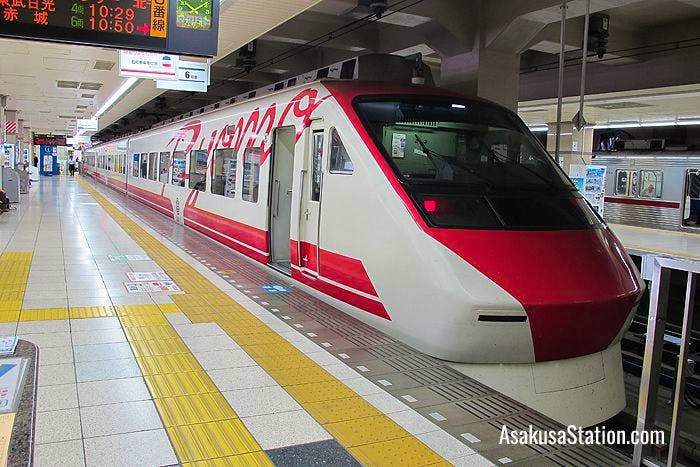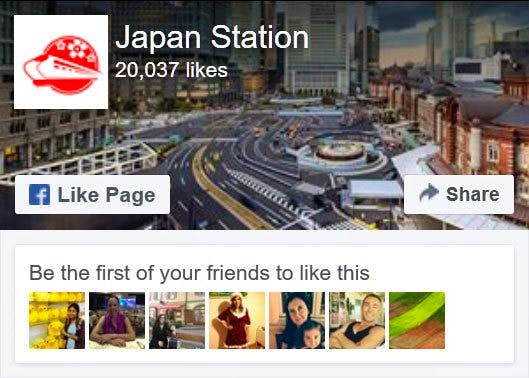The Limited Express Ryomo connects the city of Tokyo with destinations in the prefectures of Gunma and Tochigi. At Tobu Asakusa Station the Ryomo departs from platforms 3 and 4. There is an information desk at the entrance to these limited express platforms where you should show your ticket before boarding. As Tobu Railway is a private company this service is not covered by the Japan Rail Pass.

The Limited Express Ryomo bound for Ota at Platform 3 Tobu Asakusa Station
Alternative Routes
The majority of Ryomo services run between Tobu Asakusa Station in Tokyo and either Ota Station or Akagi Station in Gunma. However, some services run between Asakusa and the following terminal stops: Tatebayashi Station and Isesaki Station in Gunma, and Kuzu Station in Tochigi.

Departure information for the Limited Express Ryomo
There are 16 daily services from Tobu Asakusa Station to Akagi Station and 15 return services from Akagi Station.
There are 7 daily services from Tobu Asakusa Station to Ota Station and 8 return services from Ota Station.
There is one daily service each way between Tobu Asakusa and the following terminal stops: Tatebayashi Station, Kuzu Station, and Isesaki Station.
Key Destinations
Services between Asakusa and the terminal stops of Tatebayashi, Ota, and Akagi follow the route below. Not all services stop at Kazo and Hanyu stations.
Tobu Asakusa – Tokyo Skytree – Kita-Senju – Tobu Dobutsu-koen –Kuki – (Kazo) – (Hanyu) – Tatebayashi – Ashikagashi – Ota – Yabuzuka – Shin-Kiryu – Aioi – Akagi
The daily service for Kuzu stops at the following stations after Tatebayashi:
Tatebayashi – Sanoshi – Sano – Tanuma – Kuzu
The daily service for Isesaki stops at the following stations after Ota:
Ota – Kizaki – Sakaimachi – Shin-Isesaki – Isesaki
The key destinations with rail fares (including limited express surcharges) and example train times are given below.
From Asakusa to Akagi:
Akagi Station itself is not a major tourist destination, but there are plenty of interesting locations on this route.
Tokyo Skytree Station
This is the terminus for Tokyo Skytree which is the world’s tallest tower at 634 meters high. The Skytree is a broadcasting tower and also a major tourist destination with plenty of shopping and dining facilities, and upper level observation decks.
Train fare: 660 yen
Train time: 3 minutes
Kita-Senju Station
At Kita-Senju Station passengers can transfer to the JR Joban Line, the Tsukuba Express, and Tokyo Metro’s Chiyoda and Hibiya lines.
Train fare: 710 yen
Train time: 12 minutes
Tobu Dobutsu-koen Station
This station is a ten minute walk from Tobu Zoo which is labelled a “hybrid leisure land” as it also includes a theme park with 30 different rides, and a water park with a variety of pools including a wave pool and water sliders. The zoo has 150 species of animal including rare white tigers.
Train fare: 1,100 yen
Train time: 35 minutes
Tatebayashi Station
Tatebayashi’s chief attractions are the azalea park at Tsutsujigaoka Koen, the large flower park at Tobu Treasure Garden, Gunma Museum of Art, and Morinji Temple which is known as the setting of a famous folktale about a magical raccoon-dog.
Train fare: 1,920 yen
Train time: 1 hour and 4 minutes
Ashikagashi Station
This station serves the city of Ashikaga in Tochigi Prefecture. Ashikaga’s best known attraction is the Ashikaga Flower Park which has a variety of seasonal flower displays and most notably 350 wisteria shrubs that bloom from late April till early May. Other attractions include 700 year old Bannaji Temple, and Ashikaga Gakko which was first founded in the 9th century and is Japan’s oldest school. The school is now a designated National Historic Site and features beautifully restored thatched roof buildings and landscaped grounds.
Train fare: 2,000 yen
Train time: 1 hour and 19 minutes
Ota Station
Ota Station is a ten minute taxi ride from the remains of Kanayama Castle, and nine minutes from Daikoin Temple which was established in 1618 by the shogun Tokugawa Ieyasu.
Train fare: 2,090 yen
Train time: 1 hour and 32 minutes
Yabuzuka Station
This station is convenient for the Yabuzuka Onsen hot spring spa resort.
Train fare: 2,230 yen
Train time: 1 hour and 44 minutes
Shin-Kiryu Station
This station serves the city of Kiryu which historically was a center of the silk textile industry. The city has a lot of old architecture, and is especially known for its saw-tooth roof textile mills. Two prominent museums are the Yukari Textile Museum and the Kiryu Textile Memorial Hall.
Train fare: 2,230 yen
Train time: 1 hour and 50 minutes
From Tatebayashi to Kuzu:
Sano Station
The city of Sano is well known for its noodles. There are many delicious ramen noodle shops and a Soba Noodle Festival is held here every October.
Train fare: 2,000 yen
Train time: 1 hour and 22 minutes
Kuzu Station
Kuzu Station is convenient for Asama Jinja Shrine on Mount Asama. This is not a major tourist destination. However, a dramatic Fire Festival is held here towards the end of July each year. During the festival a long line of large straw bales is set alight to create a fiery trail up the mountain all the way to the shrine on the summit.
Train fare: 2,090 yen
Train time: 1 hour and 38 minutes
From Ota to Isesaki:
Isesaki Station
The main attraction in the city of Isesaki is Kezoji Amusement Park which has many rides for children, a roller coaster and a large Ferris wheel.
Train fare: 2,230 yen
Train time: 1 hour and 57 minutes

The Limited Express Ryomo bound for Akagi at Platform 4 Tobu Asakusa Station
On Board Facilities
The Limited Express Ryomo does not have an on board kiosk or cart services, so it is a good idea buy supplies at station shops or platform kiosks before boarding the train. On a limited number of services (services #1, #3, and #6) there are vending machines from which you can get soft drinks. All seats are non-smoking.
Buying Tickets
Limited express trains require seat reservations, so you will have to pay a limited express surcharge as well as paying for your train ticket. You can buy limited express tickets from automated machines on the 1st and 2nd floor of Tobu Asakusa Station, or you can buy them from the ticket office on the 1st floor.
Timetables
Complete English PDF timetables for Tobu Limited Express services which include Ryomo services can be downloaded from the official Tobu Railway website.
Article and original photos by Michael Lambe. All rights reserved.
